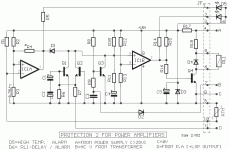Hi
I have this circuit working for a while :
http://users.otenet.gr/~athsam/protection_2_EN.htm
The original works from a DC60V supply and I had modified it to work on a 33V which was available when I approach it. Now I am thinking of working this on a 25.2V supply (18V AC) and I would like some advice on it, Tks
1. As A=25.2V, R18=0 (direct connect) where R17 will have to be changed to maintain a 15V for LM393.
2. As B=18V AC, R8, R9 will have to be manipulated ??
3. Back to R17 again : I have checked that LM393 can worked at a supply voltage of 2 - 36V, will R17 be absolutely necessary? But of course if R17 is shorted, the reference voltage (15V) for the comparators' input will change and hence most of the resistor values.
The reason I am asking 3 is because i am thinking of working this circuit using 12V relays also. And if the LM393 can work at different voltages then I can supply the circuit with a clamped (hope this is the right word) voltage of 12 or 24V (using the appro. relays also) totally eliminating both R17, 18.
I think this circuit takes care of most needs :
1. a delay turn on of speaker,
2. a dc detection
3. a thermal warning.
Tks for your input
I have this circuit working for a while :
http://users.otenet.gr/~athsam/protection_2_EN.htm
The original works from a DC60V supply and I had modified it to work on a 33V which was available when I approach it. Now I am thinking of working this on a 25.2V supply (18V AC) and I would like some advice on it, Tks
1. As A=25.2V, R18=0 (direct connect) where R17 will have to be changed to maintain a 15V for LM393.
2. As B=18V AC, R8, R9 will have to be manipulated ??
3. Back to R17 again : I have checked that LM393 can worked at a supply voltage of 2 - 36V, will R17 be absolutely necessary? But of course if R17 is shorted, the reference voltage (15V) for the comparators' input will change and hence most of the resistor values.
The reason I am asking 3 is because i am thinking of working this circuit using 12V relays also. And if the LM393 can work at different voltages then I can supply the circuit with a clamped (hope this is the right word) voltage of 12 or 24V (using the appro. relays also) totally eliminating both R17, 18.
I think this circuit takes care of most needs :
1. a delay turn on of speaker,
2. a dc detection
3. a thermal warning.
Tks for your input
Attachments
keep R17 & R18.
change their values if necessary.
For a supply below 25Vdc use a 12V relay.
for >=25Vdc keep the 24V relay. But ensure the relay pulls in reliably when the mains voltage drops to minimum tolerance.
If you add an electrolytic capacitor (33uF 63V works for mine) between the emitter of Q4 and the bottom of R18 (or pins 5 to 8), you can operate the relay at much lower voltages. The cap stores charge and fires the relay when the transistor turns on and then when discharged the resistor keeps the relay on but at much reduced current.
This allows the relay to runner cooler, draw less current from the supply and lets the relay drop out more quickly when triggered off.
You may find that you can operate a 24V relay from a low supply voltage of 22 to 23Vdc during times of low voltage mains supply.
Similarly a 12V relay may operate well on an 11V supply.
change their values if necessary.
For a supply below 25Vdc use a 12V relay.
for >=25Vdc keep the 24V relay. But ensure the relay pulls in reliably when the mains voltage drops to minimum tolerance.
If you add an electrolytic capacitor (33uF 63V works for mine) between the emitter of Q4 and the bottom of R18 (or pins 5 to 8), you can operate the relay at much lower voltages. The cap stores charge and fires the relay when the transistor turns on and then when discharged the resistor keeps the relay on but at much reduced current.
This allows the relay to runner cooler, draw less current from the supply and lets the relay drop out more quickly when triggered off.
You may find that you can operate a 24V relay from a low supply voltage of 22 to 23Vdc during times of low voltage mains supply.
Similarly a 12V relay may operate well on an 11V supply.
- Status
- Not open for further replies.
